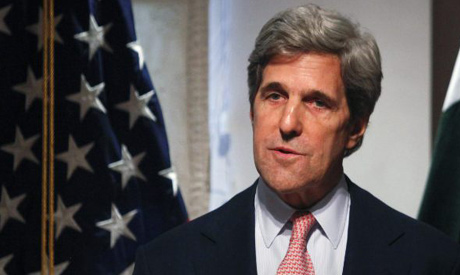
US Secretary of State John Kerry (Photo: Reuters)
Egyptian diplomats on Friday welcomed the statement made by King Abdullah of Saudi Arabia expressing his support for Egypt, in the face of an increasing pressure on Cairo from Europe and the US.
This was followed by a similar statement from the United Arab Emirates, which Egyptian diplomats told Ahram Online was “very positive.”
The close ties both Saudi Arabia and the United Arab Emirates have with the US reassured Egyptian diplomats on Friday evening. They have been faced with a sequence of diplomatic challenges recently, including a discussion at the UN Security Council on Egypt, and joint French-German statements suggesting a possible re-examination of European Union relations with Egypt.
Several EU and non-EU European countries have already taken steps to show dismay after what Cairo-based European diplomats say was an unjustifiably violent dispersal of two sit-ins by supporters of ousted president Mohamed Morsi in Cairo on Wednesday.
EU foreign policy chief Catherine Ashton had expressed “shock” over the number of victims of violence in Cairo.
Ultimately, Egyptian diplomats assess that whatever happens in Europe is only a reflection of the position of Washington. “Obviously the European countries, especially those in southern Europe, have direct and pressing concerns with regards to stability and its impact on illegal migration, but at the end of the day Washington has a serious interest not to rock the boat with Egypt,” said one Egyptian diplomatic source who asked to remain anonymous.
Since the signing of the Camp David Accords in 1979, Egypt has been a key part of US efforts to ensure the region’s stability, and particularly to prevent war with Israel. Egypt has also been influential in isolating all political groups whose aims run contrary to those interests, particularly Hezbollah and Hamas. Under Hosni Mubarak, these groups were directly confronted by the Egyptian government but under Mohamed Morsi, the government adopted a containment policy.
The US has other key strategic interests in Egypt related to the Suez Canal.
“At the end of the day the US cannot simply rock the boat with Egypt. It has to show dismay over the high death toll and the graphic images coming out of Egypt during the past two days, hence the statement of US President Barack Obama and the plan to put off joint military manoeuvres with Egypt, but it has to be taken into consideration that the US, despite all the developments, has not qualified the ouster of Morsi as a military coup and that the US administration has not bowed to pressure to suspend military aid to Egypt,” said a Washington-based Egyptian diplomat.
In 2009, the US suspended part of its military aid to Egypt over disputes regarding Cairo’s record on human rights. Egyptian government officials admit that this time round tension is much higher, but they argue that it is not an irreversible downhill trend. Tension, they say, could be contained, even after a relatively long period of unease, if the situation on the ground does not deteriorate and if the process of democratic transition is promptly pursued in a way that would allow for legislative and presidential elections.
Egyptian diplomats stressed to Ahram Online that despite the unmistakable support that Washington had largely offered to the Muslim Brotherhood government - either directly or through both Turkey and Qatar – when Mohamed Morsi was removed, the US envoy to Egypt Bill Burns did not just pressure the new government, he also urged the Muslim Brotherhood to come to the negotiating table. “They basically told them that they have to accept that Morsi was not going back to office,” said one.
Since the ouster of Morsi on 3 July relations between Cairo and Washington have for the most part been executed through direct daily talks between Minister of Defence Abdel Fattah El-Sisi and his counterpart at the Pentagon, Chuck Hagel. These contacts have at times overlooked the unpopular US ambassador to Egypt Anne Patterson, who is largely blamed in many political and diplomatic quarters in Egypt for disturbing the otherwise stable relationship.
The choice of the next US ambassador, given that Patterson will depart this autumn, will be crucial in helping to fix the tension of the past year. No official nomination has been made yet but there is equal speculation about both the US ambassador in Amman, Stewart Jones, who had served as deputy chief of mission in Cairo up for four years until 2009, and the former US ambassador in Damascus, Richard Ford who is perceived as an unfavourable choice by many in Cairo.
Egyptian diplomats tell Ahram Online that Jones is well-liked in Cairo. But the key challenge for Egyptian diplomacy today is to contain the tension with the US. “It is not just a US interest, it is also an Egyptian interest to stop the decline in relations,” reminded the Washington-based Egyptian diplomat. “It is clearly a two-way street,” he said.
Short link: